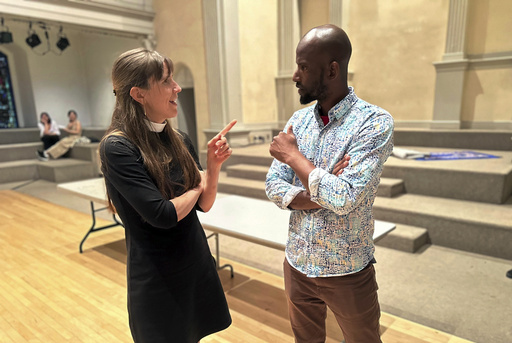NEW YORK (AP) — New York City stepped up its efforts to push migrants out of its overwhelmed shelters Wednesday as it began enforcing a new rule that limits some adult asylum-seekers to a month in the system before they have to find a bed on their own.
Migrants without young children must now move out of the hotels, tent complexes and other shelter facilities run by the city and find other housing after 30 days — or 60 days for those aged 18-23 — unless they provide proof of “extenuating circumstances” and are granted an exemption.
As of late Wednesday, 192 migrants had applied for an extension after hitting their limit, and 118 had been approved, Mayor Eric Adams’ office said. Thousands more are expected to receive eviction notices in the coming months.
Mamadou Diallo, a 39-year-old from Senegal, says he’s not sure where he’ll go when his time expires later this week at a shelter in the Bronx.
He hopes to get an extension, noting that he just filed his asylum application and has been taking English classes but can’t apply for a work permit under federal rules until about five months after applying for asylum.
“I don’t have anywhere to go,” Diallo said Wednesday. “I’m going to school. I’m looking for a job. I’m trying my best.”
The new restrictions came after Adams’ administration in March succeeded in altering the city’s unique “ right to shelter ” rule requiring it to provide temporary housing for every homeless person who asks for it.
Before the new rule came into effect, adult migrants without children were still limited to 30 days in a shelter, but they were able to immediately reapply for a new bed with no questions asked.
The city also restricts migrant families with young children to 60-day stays, but they aren’t impacted by the new rule and can still reapply without providing any justification.
Still, an audit found that the rollout was “haphazard,” over the past six months
Immigrant rights and homeless advocates say they’re closely monitoring the eviction process, which impacts some 15,000 migrant adults. The city shelter system currently houses about 65,000 migrants, but many of those are families with kids.
“Our concern is people will be denied for reasons that could be appealed or because of some error or because they didn’t have all the documentation required,” said David Giffen, executive director of the Coalition for the Homeless. “We’re watching very carefully to see if that happens because nobody in need of shelter in New York City should ever be relegated to sleeping on the streets.”
Adams, a Democrat, on Tuesday pushed back at critics who have called the city’s increasingly restrictive migrant shelter rules inhumane and haphazardly rolled out, saying the city simply can’t keep housing migrants indefinitely. New York City has provided temporary housing to nearly 200,000 migrants since the spring of 2022, with more than a thousand new arrivals coming to the city each week, he noted.
“People said it’s inhumane to put people out during the wintertime, so now they say it’s inhumane to do it in the summertime,” Adams said. “There’s no good time. There’s no good time.”
The move comes as Denver, another city that’s seen an influx of migrants, embarks on an ambitious migrant support program that includes six-month apartment stays and intensive job preparation for those who can’t yet legally work. Meanwhile Chicago has imposed 60-day shelter limits on adult migrants with no option for renewal, and Massachusetts has capped stays for families to nine months, starting in June.
Adams had asked a court in October to suspend the “right to shelter” requirement entirely, but the move was opposed by immigrant rights and homeless advocacy groups. In March, they settled, with an agreement that set the new rules for migrants.
The agreement still allows for city officials to grant extensions on shelter stays on a case-by-case basis.
City officials say migrants need to show they’re making “significant efforts to resettle,” such as applying for work authorization or asylum, or searching for a job or an apartment.
Migrants can also get an extension if they can prove they have plans to move out of the city within 30 days, have an upcoming immigration-related hearing or have a serious medical procedure or are recovering from one.
Migrants between the ages of 18 and 20 years old can also get extensions if they’re enrolled full-time in high school.
“While these changes will require some adaptation, we are confident that they will help migrants progress to the next stage of their journeys, reduce the significant strain on our shelter system and enable us to continue providing essential services to all New Yorkers,” Camille Joseph Varlack, Adams’ chief of staff, said Wednesday in an emailed statement.
___
Follow Philip Marcelo at twitter.com/philmarcelo.
